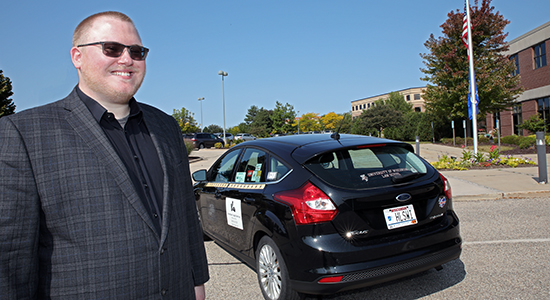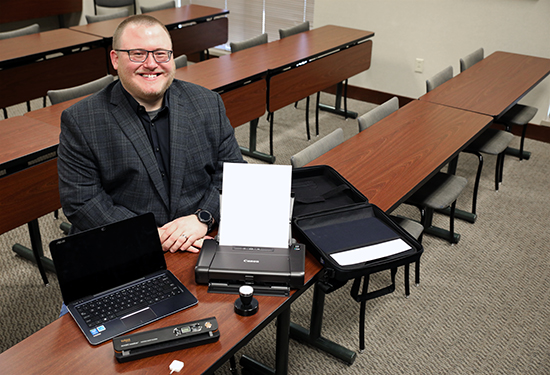
Forrest Crawford of Cottage Grove is the “mobile lawyer,” with his office equipment in his briefcase and advertising on his car. His mobility, he says, is a benefit to his small business and estate planning clients.
Nov. 1, 2017 – Order fast food, gain a client.
For any lawyer, it’s a good moment: when someone asks you for your business card. For one Wisconsin lawyer, that moment recently happened when he went through the drive-thru at a fast-food restaurant.
Forrest John Crawford of Cottage Grove takes the word “mobile” very seriously. He has everything he needs in his car: a tablet computer, a small document scanner, and a battery-powered printer that allow him to make changes to documents while in the field.
And his car is a moving advertisement for his solo firm: magnetic business cards line the vehicle’s sides, like a dashed (but rather wide) pinstripe. A large magnetic logo on each side displays his firm name of “Hometown Legal Services,” along with phone number and website address. And attached to one passenger window, encased in a lidded plastic box, are his business cards, available for anyone to take.
And yes, people really do take cards from the holder.
The Mobile Lawyer
Crawford believes he may have found the perfect setup for a solo-practice lawyer just starting out. It’s a solution that keeps his overhead costs minimal while maximizing visibility. It also gives him the ability to meet his small business clients at their business, and his elderly estate planning clients at their homes.
Mobile lawyering is an integral component of his plan as a new lawyer: hit the ground running and build momentum to achieve a viable community practice in as short a time as possible.
For him, it’s working.

Solo attorney Forrest Crawford of Cottage Grove is pictured here with this “office in a briefcase,” which includes a laptop, portable scanner, notary stamp, and printer.
The Second Career
A native of western New York, the 30-year-old started his second career on June 1, 2016 – the day he was admitted to the State Bar of Wisconsin.
His path to Wisconsin is the result of a path of self-discovery – and much careful thought.
Shannon Green is communications writer for the State Bar of Wisconsin, Madison. She can be reached by email or by phone at (608) 250-6135.
He earned undergraduate degrees at the University of Buffalo-New York in biomedical science and psychology, and worked for several months at the graduate level in cellular biology. Not long into his graduate career, he realized he was on the wrong path.
“I said to myself, ‘I hate everything about this,’” he said. He had to make a change. “I sat down, and I did some soul-searching.”
That’s when he started to consider law – but knowing his own strong reaction to his previous career, he tested it out first.
“I didn’t want to make the same mistake,” Crawford said.
He worked first as an assistant at the public defender’s office in Buffalo, New York – and after six months came to the conclusion that criminal law was not for him. He next worked at a mid-size firm in Buffalo, helping out with Social Security and disability issues. “Despite witnessing overwhelmed attorneys, I thought ‘this is the job for me,’” Crawford said.
Office in a Briefcase
For the curious, here’s what’s in Forrest Crawford’s mobile office:
-
Canon Pixma iP110 wireless mobile printer ($149.00)
-
Canon LK-62 rechargeable lithium-ion battery ($95.51)
-
Surf to Summit XL carrying case for portable printer ($99.99)
-
LectroFan Micro Wireless Sleep Sound Machine and Bluetooth Speaker with fan sounds, white noise, and ocean sounds – for sound masking client conversations in public areas ($34.99)
-
Vupoint Magic InstaScan PDS-ST420-VP sheetfed scanner, $99.99
-
Asus T300CHI 12.5 Touch Transformer 2-in-1 Convertible Tablet ($426.00) (he purchased a new one on eBay for $369.99 in 2016)
-
Standard printer paper and premium paper for estate documents
-
Spare envelopes and folders for documents
-
Pens, plus extra pens
-
A notepad
-
Notary stamp (and notary book)
-
Extra business cards
-
Spare batteries for the scanner
His application to law school at UW-Madison was accepted. He was quickly advised, with his background in science, to try patent law. So he tested it out. Once again, “I didn’t feel it was right for me,” he said.
That was when he realized something else: he wanted to pursue a solo practice, focusing on helping small businesses.
He spent his third year with that goal in mind, taking the Lawyering Skills class, volunteering with the Law and Entrepreneurship Clinic, and setting up a website. He also approached other solo attorneys for advice. “I had a realistic view of what I was getting into,” he said. “Those connections resulted in work being sent my way, which really helped out in the beginning when clients were scarce.”
A Yearlong Test
He made a deal with his wife: let me try it for a year, then they would reassess his plans.
While he has an office in his home, “I decided I was going to fully embrace the ‘mobile lawyer’ idea,” he said. Without the costs of maintaining an office, he keeps his overhead very low.
His efforts worked. The same day as his admission to practice, he opened up shop with his website going live. “I had everything preloaded, so I literally had to hit a button and I was off,” Crawford said.
And nearly immediately, he got a call from a potential first client. Trying not to sound too surprised, he eagerly told them “I’m free – I can stop in.” And they hired him, even after he confessed that he had only just graduated.
The Key to Growing Your Business: Making Community Connections
After that first call, “things were slow.”
To make it work, he knew he had to be creative. “I had some barriers to overcome – my nontraditional setup, the fact I was a new lawyer,” he said.
With his home base in Cottage Grove, he joined the Chambers of Commerce of Cottage Grove, Sun Prairie, and Stoughton – getting involved in those communities. “I’d say, 80 to 85 percent of my initial business came from connections I made with the Chambers,” he said.
He also concentrated on volunteer work and on being visible in the community. “I let people know I existed,” he said. And he focused on doing what he liked. “Those connections resulted in work sent my way,” he said.
An Advertising Opportunity
Crawford also used a resource nearly every lawyer has: his vehicle.
He began, at first, with the car magnets – displaying his logo – then added the other items to the outside of his car.
Driving around in the community, he has noticed that the car draws the desired attention. “I have been approached at the post office and gas station by potential clients and small-business owners,” he said. And the fast-food cashier? “He has a friend with a small business who needs legal assistance.”
Being visible is part of his plan. “One of the biggest requirements for a new lawyer to be successful is to be out in the community,” Crawford said. “Having the cards on my vehicle makes every shopping trip, every trip to doggie daycare, pretty much every time I leave the house an advertising opportunity.”
The setup has let him slowly build his practice. “Otherwise, starting up my practice would have been a lot more difficult.”
Not Exactly the Planned Path
One year and five months along, his wife agrees that he should keep going.
“Becoming a lawyer wasn’t exactly the path I thought I’d take when I was younger, but I’m very happy now. I can’t see myself doing anything else,” Crawford said.
Meanwhile, you can’t miss his black Ford Focus. “It has been a good journey so far,” he said.
